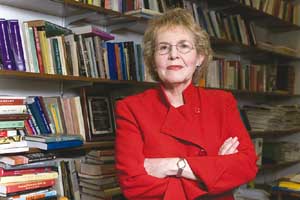Elshtain to deliver Gifford Lectures
By Jennifer CarnigNews Office
 Jean Bethke Elshtain | |
For the fourth time—more often than at any other college or university—a Divinity School faculty member has been chosen to deliver the Gifford Lectures, one of the most prestigious theological honors in the world. Jean Bethke Elshtain, the Laura Spelman Rockefeller Professor of Social and Political Ethics in the Divinity School, will deliver the 2005-2006 Gifford Lectures in Scotland, an honor previously bestowed on such intellectual luminaries as William James, Albert Schweitzer and John Dewey.
Elshtain, a prominent political philosopher and social thinker whose work focuses on the morality of American political convictions, will join the ranks of three University faculty members who have given the Gifford Lectures—theologian David Tracy, the Andrew Thomas Greeley and Grace McNichols Greeley Distinguished Service Professor in the Divinity School, and philosophers Paul Ricoeur and Martha Nussbaum, the John Nuveen Professor Emeritus in the Divinity School and the Ernst Freund Distinguished Service Professor of Law and Ethics in the Law School, Philosophy and the Divinity School, respectively.
“I don’t get excited too easily, but I’m pretty excited about this,” said Elshtain, who currently is teaching classes on the just war tradition, and religion and the political order. “To be included in the company of people who I’ve looked up to and admired for so many years is quite amazing. I feel truly honored.”
Elshtain was a natural choice for the privilege, said Richard Rosengarten, Dean of the Divinity School.
“Jean Bethke Elshtain’s selection as a Gifford Lecturer underscores her standing as one of the world’s preeminent contemporary thinkers on moral and theological issues,” Rosengarten said. “We are absolutely thrilled for Jean for this recognition of her distinguished work.”
Elshtain plans to deliver her lectures on the topic of sovereignty. She will address the philosophical, theological and historical concepts of sovereign God, sovereign state and sovereign self, exploring the implications and respective fates of these sovereignties in the postmodern world.
Her lectures, which she plans to turn into a book once she has presented them, will examine the historical and conceptual links between early theological understandings of the sovereignty of God with formulations of state sovereignty that arose in the 16th and 17th centuries. She plans then to explore the relationship that exists between concepts of state sovereignty and modern concepts of self-sovereignty.
After asking critical questions about all of these ideas of sovereignty, Elshtain said she hopes to introduce an alternative vision—an understanding of God that is more relational and less top-down, a vision of independent political units that are not sovereign in the classic sense, and a view of individual freedom that is different from contemporary notions of self-sovereignty.
A popular lecturer and a contributing editor for the New Republic, Elshtain is the author of more than 500 essays that have been published in scholarly journals and journals of civic opinion.
Among her books are Jane Addams and the Dream of American Democracy (2001), New Wine in Old Bottles: International Politics and Ethical Discourse (1998), Democracy on Trial (1995), Women and War (1987), and Public Man, Private Woman: Women in Social and Political Thought (1981).
Her most recent book, Just War Against Terror: The Burden of American Power in a Violent World (2003), was recently released in paperback and praised by the New York Times Book Review for challenging simplistic assumptions about the war against terror and offering instead “intellectual clarity.” Publisher’s Weekly named it one of the best non-fiction books of 2003.
“Jean Bethke Elshtain is absolutely unique,” said Robin Lovin, an ethicist at Southern Methodist University’s Perkins School of Theology who previously taught in the Divinity School. “She has a background in political science and has taught in political science departments, and is now on a theological faculty. There are not many out there with her expertise in philosophy and political science who also have her historical understanding of Christian theology.”
Before she joined the University’s faculty in 1995, Elshtain was professor of philosophy and the centennial professor of political science at Vanderbilt University, where she also served as director of the Center for Social and Political Thought. She received her B.A. in history from Colorado State University in 1963, her A.M. from the University of Colorado in 1965 and her Ph.D. in politics from Brandeis University in 1973.
“She is one of the very few political theorists writing today who can be trusted to say sensible things, and to write with insight on the relation of religion and politics and of theology and philosophy,” said Michael Walzer of the Institute for Advanced Study in Princeton, N.J. “I wish that I could be in the audience for her Gifford Lectures,” added Walzer, who has previously worked with Elshtain on a fellowship project.
The Gifford Lectureship was established in 1885 in the will of Lord Gifford of Scotland, which stipulated that a series of lectures be created to promote the study of natural theology, “in other words, the knowledge of God.”
The lectures are held each year at the four major Universities of Scotland—Edinburgh, Glasgow, Aberdeen and St. Andrews—and have become an important intellectual event in the study of religion. Other previous winners include Reinhold Neibuhr, Karl Barth, Sir James Frazer and Hannah Arendt.
![[Chronicle]](/images/sidebar_header_oct06.gif)